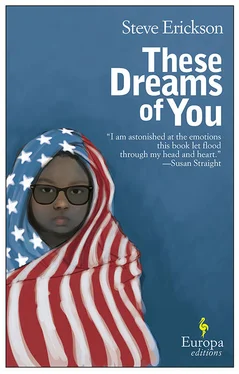Immediately enflamed, Zan said, “Yes,” and Parker pulled the trigger. With a squeak, the rodent fell. Half an hour later, Zan was in the office upstairs when Parker came in, tentative, as close to weepy as his age allowed anymore. “What’s the matter?” said Zan. Softly Parker said, “I feel bad about it. It was a little one. It made a noise when I hit it.” After a moment Zan said, “I told you to shoot it, it’s not your fault. Listen, I can’t say I’m sorry about killing the rats. But it’s right that you have feelings about it.” They went downstairs and Zan looked for the body of the mouse behind the sofa where it fell; it wasn’t there and, for his son’s sake, Zan was relieved. “You didn’t kill it,” he told Parker, “it would be here if you did. Must have winged it.”
“Good,” said Parker.
Flickers of conscience aside, lately the boy puts his fist through the thin walls of his room. No wonder, thinks Zan, his hand hurts all the time. “You have a right to get angry,” Viv rails at their son, “but you don’t have the right to destroy the walls!” though Zan wonders if Parker knows about the foreclosure and finds a certain justice in taking out his anger on the house. Zan and Viv buy for Parker a punching bag in the form of a man whom the boy names Alejandro.
More alarming have been Parker’s plots to escape. After one blow-up, Zan caught him trying to go through the two-story window: “You care more about Sheba than you do me!” the boy yelled at his father. “You’re better off without me!” and though Zan realized some of this was drama engendered by too much reality TV and internet posturing, Parker shook with a fury that wasn’t faked. One time he actually left. Forty minutes later he was back, but not soon enough to undo the trauma; and since then, every time Zan hears the slam of a door or finds a window agape, he wonders if his son has gone. Of course Zan and Viv don’t feel remotely ready for any of it. Zan still is recovering from his son casually using the word “orgasm” in conversation with his buddies in the back of the car on the way home from school.
He’s twelve. It’s part of his job description as a twelve-year-old to believe the modern age began the day he was born. To the extent that it was about anything to Parker, the recent election wasn’t about history, it wasn’t about politics, it was about one candidate being cool and the other one not; if there was a single kid in Parker’s school who was for the other guy, he or she kept quiet about it. Parker is the mindless embodiment of the oldest liberal cliché: Some of his best friends are black, particularly Thomas, the son of a black mother from the Bahamas and a white German body-builder who scandalized Parker’s school by showing up at a Halloween festival as an SS officer. Turning stereotypes on their heads, in the election the black born-again Christian mother voted for the white conservative and the white German with SS fantasies voted for the black liberal. “No more old men,” Thomas’ father scowled. Like any kid who instinctively understands he’s a resident of the future and already has his young eye on his true home in time, Parker is bored by the past, so it means nothing to Parker now that the city where they arrive the next evening, after spending a night in Paris and taking the long eleven-hour train, again and again has been at the crux of the past century.
But Zoo Station, where once Zan came into Berlin fourteen years before, right after the fall of the Wall, has given up to the new Hauptbahnhof its gateway to the rest of the world. As their train approaches over water — the surrounding lakes overrunning their shores in the rain to form a moat — the sight of the new trainport, emblazoned on the outside with neon stars, and the windowless future-city of globes, with its panoramas of graffiti and passages in the sky mirroring the hundreds built underground half a modern era go, perk Parker up for a moment.
In the Hauptbahnhof, Zan stares at the U-Bahn map in mute and utter confusion. He never understood the city the first time he was here; it had a hole in the middle, and Zan has learned from Los Angeles that it takes a lifetime to navigate such cities. He leads Parker to several hotels off the Kurfürstendamm, with its dark clotted shadows of the trees that line it and the display windows of the shops that shine like gold boxes. At every front desk Zan asks if by some chance someone with Viv’s name or description is checked in, and then asks for a room, always concluding to his son, “We’re not staying here.” One hotel, he explains to Parker, “has no WiFi.” Another “has no room-service.”
At midnight, when they check into an inn at the southern end of the Wall where an old recording studio used to be, Parker looks at the room and then his father in disbelief. It’s bare, cold, damp; there drifts through the window languages unlike any the boy has heard. The tiny television has something Parker has never seen: antennae, which makes it look like a monstrous bug. “Here?” Parker howls in disbelief. “ They don’t have WiFi! They don’t have room service!”
Zan returns his son’s livid gaze in crestfallen silence.
“This is horrible,” says Parker. “The other hotels at least spoke English.”
Zan is tired of every single decision being about money. He doesn’t flatter any sense of his own victimization by believing they’re exactly poor; Zan understands that a crummy hotel isn’t a serious definition of poverty. Poverty, he knows, is not only having no money or resources but no hope; and though he has no idea what hope they might reasonably entertain at this point, he hasn’t yet given up assuming that it exists or someday will. “Parker,” he answers his son quietly, “we couldn’t afford the other places. I’m sorry.”
To Parker, the endless survey and rejection of hotels this evening — it wasn’t really endless, only four or five, but seemed endless to the boy — wasn’t unlike watching a cab crash into the same limo over and over. It’s an old part of town where they are now, and the dreariness he feels is compounded by the sight not so far away of the Potsdamer Platz at its most ultra-modern; once the no-man’s land of the Wall before monied victors of the Cold War like Sony and Mercedes moved in, it hovers in their room’s window taunting them.
Parker feels the future snatched back from him again. He feels like someone who’s been sentenced to a penal colony on another world, or like the astronaut he sees in science-fiction movies always floating in space, with that single fragile line the only thing that connects him to home, or something with the name of home — the line you know is bound to break.
The “bathroom,” the boy is mortified to observe, isn’t separate but part of the same single room where the beds are. “You can sleep in the tub,” Zan tries to joke about the large white porcelain bowl that is the room’s most prominent furniture. Parker glares at him. He refuses to take a bath. When he goes to the bathroom he insists on turning out the room’s light, sitting on the toilet and finally managing to pee by pretending his father doesn’t exist.
The next day, the two go to the eastern side of the Brandenburg Gate, out on the Unter den Linden. To Parker, the massive boulevard is as wide as a river — and suddenly the idiocy of the entire journey becomes so evident that even a twelve-year-old can see it, maybe especially a twelve-year-old. The man and boy stand on the edge of the boulevard gazing across.
Читать дальше











